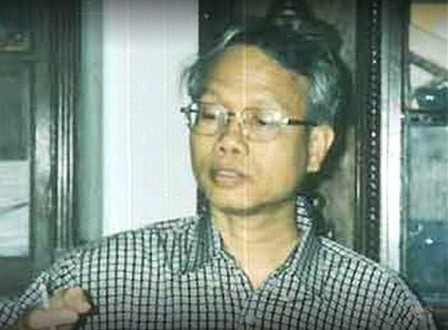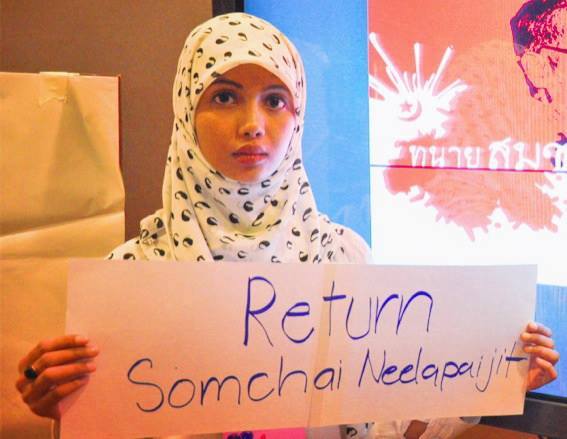In a landmark case to set a legal standard on enforced disappearance, the Thai Supreme Court has acquitted five police officers allegedly involved in the enforced disappearance of Somchai Neelapaijit, a Muslim human rights lawyer.
After 11 years of legal struggle by Somchai’s family, the Supreme Court of Thailand on Tuesday, 29 December 2015, confirmed the Appeal Court acquittal of five policemen accused of involvement in the enforced disappearance of Somchai.
The court reasoned that the primary evidence in the case, the phone records of the five police officers, was weak and the testimony of witnesses was unreliable and contradictory.
The Supreme Court also ruled that the Neelapaijit family cannot act as joint plaintiff on Somchai’s behalf because it cannot be confirmed that he was murdered or injured to the extent that he is unable to act for himself.
Somchai disappeared almost 11 years ago while he was representing separatist suspects from the Muslim Deep South in a case where weapons were stolen from Narathiwat Rajanagarindra Army Base in Cho-airong District of Narathiwat Province.
He disappeared on 12 March, 2004, a few days after he found out that his clients had been tortured and forced to confess while in the hands of the Crime Suppression Division (CSD) and exposed the torture allegations. He was forcibly disappeared by five police officers, some of whom were identified by Somchai’s clients as the torturers.

Somchai Neelapaijit
His body was never found and the only officer to be convicted of coercion and robbery went missing.
In May 2014, the Supreme Court ruled not to allow a trial with additional witnesses, submitted by the plaintiff in the case of the disappearance of Somchai.
Earlier, the Appeal Court in March 2011 acquitted all the defendants due to insufficient evidence. It also ruled that Somchai’s wife, Angkhana Neelapaijit, currently a National Human Rights Commissioner, could not act on her husband’s behalf as joint plaintiff, reasoning that it could not be confirmed that Somchai had been murdered.
In other words, the Appeal Court required evidence of the body of a victim of enforced disappearance before ruling that he was dead as Thailand has not yet criminalized enforced disappearance. This means the current law only recognizes a murder case when there is a dead body.
The Court of First Instance in January 2006 found only the first defendant, Pol Major Ngern Tongsuk, guilty of coercion, which is a relatively minor offence. He was released on bail. On the same day, then Prime Minister Thaksin Shinawatra spoke to the media, saying that he knew that Somchai was dead and that state officials caused his death. Ngern was identified by a witness as the person who pushed Somchai into the car. Ngern was one of the team investigating the weapons robbery case and was identified as an abuser of the Muslim suspects in the torture case.
In September 2008, Ngern went missing. However, the Department of Special Investigation (DSI) told the family recently that Ngern has not disappeared, but has escaped to a neighbouring country, according to Pratubjit Neelapaijit, Somchai’s daughter.
One of the most compelling pieces of evidence is a copy of the mobile phone records of the five defendants. On 12 March 2004, the day that Somchai disappeared, there were 75 phone calls between the five police officers, which was very unusual in comparison with the record of calls on the days before and after 12 March, which show very few contacts among the group.
The phone records also show that the group had followed Somchai since the morning until his disappearance. Interestingly, the records show that one of the defendants also called a person at the Prime Minister’s Office after the incident on Ramkhamhaeng Road and several other numbers which were censored by thick black lines.

Pratubjit Neelapaijit, human rights activist, academic and daughter of Somchai Neelapaijit
Since the police obtained the evidence unofficially and no officials from the telephone service provider testified in court, the Court of First Instance dismissed the evidence, saying that it was unreliable. Somchai’s family, as co-plaintiffs, had wished to have the telephone company and the police officer who obtained the evidence testify as prosecution witnesses to confirm the authenticity of the telephone logs so they submitted the request to the Supreme Court.
Prior the Supreme Court verdict today, Pratubjit told Prachatai that she hoped that the ruling on the enforced disappearance of her father would create a new standard on enforced disappearance cases.
“I want enforced disappearances perpetrated by state officers to be criminal offences even if [by] military officers, with the cases tried by the courts of justice because it’s a violation of human rights,” said Pratubjit.
When asked as to why Thailand has not ratified the International Covenant on the Protection of All Persons from Enforced Disappearances, Pratubjit said “I think what prevents this is fear that the [state] officers would be charged.” She added that in Thailand no state officer, especially a high ranking one, has ever been prosecuted for involvement in enforced disappearance cases.
Last year on 17 April 2014, Porlajee Rakjongcharoen (aka Billy), a Karen ethnic human rights defender, was detained by the chief of Kaeng Krachan National Park and vanished. Pinnapa, his wife, has filed a case with the court and the DSI to call for justice. However, there has been no concrete result.

